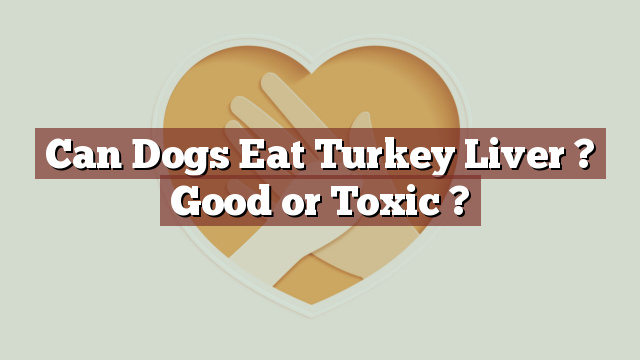Can Dogs Eat Turkey Liver? Good or Toxic?
As pet owners, it is crucial to be aware of what foods are safe and appropriate for our furry friends. Can dogs eat turkey liver? This is a common question that arises, especially during holiday seasons when turkey is a staple on many dinner tables. In this article, we will explore whether dogs can safely consume turkey liver and the potential risks and benefits associated with it.
Nutritional Value of Turkey Liver: Vitamins, Minerals, and More
Turkey liver is known to be a nutrient-dense food, packed with various vitamins and minerals essential for overall health. It is a great source of vitamin A, which plays a vital role in maintaining healthy vision, boosting the immune system, and promoting healthy skin and coat. Additionally, turkey liver contains important B vitamins such as riboflavin, niacin, and B12, which are crucial for energy production, brain function, and maintaining a healthy nervous system.
Furthermore, turkey liver is rich in iron, zinc, and copper, which are essential minerals for the proper functioning of enzymes and metabolic processes in the body. It also provides a good amount of protein, which is necessary for muscle growth and repair.
Can Dogs Eat Turkey Liver? Exploring Safety and Toxicity
Can dogs eat turkey liver? Yes, dogs can consume turkey liver in moderation. However, it is important to note that certain precautions should be taken to ensure the safety of your furry friend. While turkey liver is generally safe for dogs, it is crucial to feed it in small portions and ensure it is properly cooked. Raw or undercooked turkey liver can pose serious health risks, including bacterial infections such as Salmonella or E. coli.
It is also important to remove any excess fat from the liver before feeding it to your dog. High-fat foods can lead to pancreatitis, a potentially life-threatening condition characterized by inflammation of the pancreas.
Potential Risks or Benefits of Feeding Dogs Turkey Liver
Feeding dogs turkey liver can offer several benefits. As mentioned earlier, turkey liver is a rich source of vitamins, minerals, and protein, which are all essential for the overall well-being of your pet. The nutrients present in turkey liver can support healthy vision, promote a strong immune system, and contribute to a shiny coat.
However, it is important to consider the potential risks associated with feeding dogs turkey liver. The high vitamin A content can be harmful if consumed in excessive amounts. Too much vitamin A can lead to vitamin A toxicity, which can cause bone abnormalities, joint pain, and even lead to liver damage. Therefore, moderation is key when including turkey liver in your dog’s diet.
What to Do If Your Dog Eats Turkey Liver: Steps to Take
If your dog accidentally consumes an excessive amount of turkey liver or shows any signs of discomfort or illness, it is important to take immediate action. Contact your veterinarian to seek guidance on what steps to take based on your dog’s specific situation. They may recommend inducing vomiting or other necessary measures to prevent any potential complications.
Conclusion: Balanced Approach to Feeding Turkey Liver to Dogs
In conclusion, dogs can safely consume turkey liver in moderation. It is a nutrient-rich food that can offer several health benefits when prepared and fed correctly. However, it is crucial to ensure that the liver is properly cooked, free of excess fat, and given in appropriate portions. Additionally, monitoring your dog’s overall vitamin A intake is essential to prevent vitamin A toxicity.
As responsible pet owners, it is always advisable to consult with your veterinarian before introducing any new food into your dog’s diet. They can provide you with personalized advice based on your dog’s individual needs and help you make informed decisions regarding their nutrition and well-being.
Thank you for investing your time in exploring [page_title] on Can-Eat.org. Our goal is to provide readers like you with thorough and reliable information about various dietary topics. Each article, including [page_title], stems from diligent research and a passion for understanding the nuances of our food choices. We believe that knowledge is a vital step towards making informed and healthy decisions. However, while "[page_title]" sheds light on its specific topic, it's crucial to remember that everyone's body reacts differently to foods and dietary changes. What might be beneficial for one person could have different effects on another. Before you consider integrating suggestions or insights from "[page_title]" into your diet, it's always wise to consult with a nutritionist or healthcare professional. Their specialized knowledge ensures that you're making choices best suited to your individual health needs. As you navigate [page_title], be mindful of potential allergies, intolerances, or unique dietary requirements you may have. No singular article can capture the vast diversity of human health, and individualized guidance is invaluable. The content provided in [page_title] serves as a general guide. It is not, by any means, a substitute for personalized medical or nutritional advice. Your health should always be the top priority, and professional guidance is the best path forward. In your journey towards a balanced and nutritious lifestyle, we hope that [page_title] serves as a helpful stepping stone. Remember, informed decisions lead to healthier outcomes. Thank you for trusting Can-Eat.org. Continue exploring, learning, and prioritizing your health. Cheers to a well-informed and healthier future!

